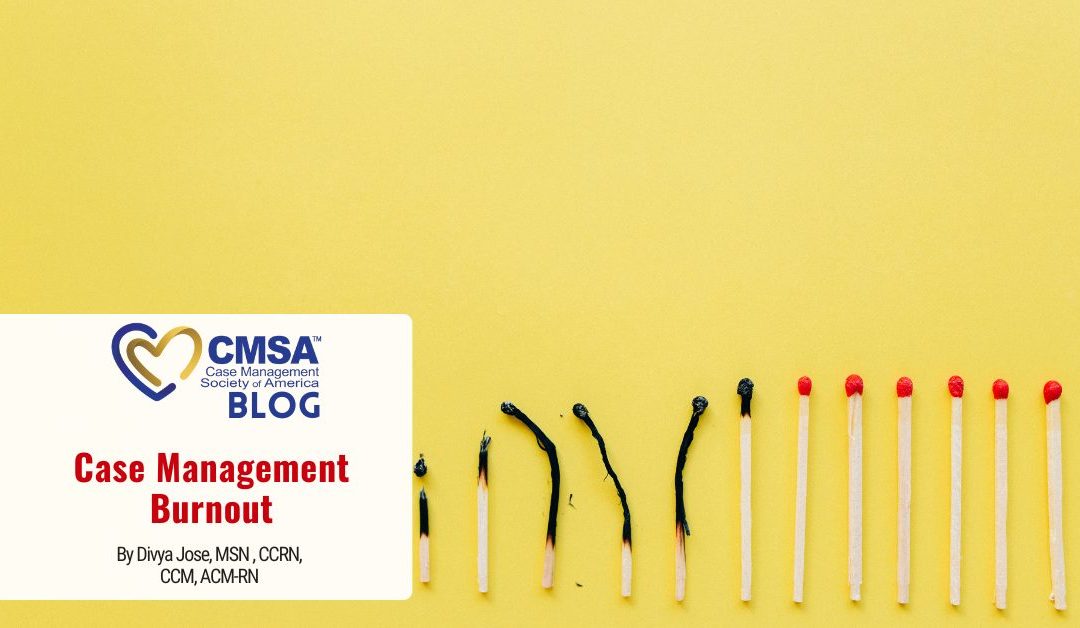By Divya Jose, MSN, CCRN, CCM, ACM-RN
I started my case management career in 2019 after five years of experience in an Intensive Care Unit. Since then, I have worked as a hospice case manager and an acute care hospital case manager, and I am now at a level-3 County hospital. I recently talked with my co-workers and learned that almost all were experiencing burnout at work.
What is Burnout?
The answer is simple: Exhaustion which results in an individual distancing themselves emotionally and cognitively from their work. The four primary injuries that can occur during burnout are trauma, grief, moral injury, and fatigue. Indications of harmful stress reactions that lead to burnout are anxiety, extreme exhaustion, and a lack of confidence. Warning signs are the refusal to follow team instructions or policies and an inability to support peers.
It is easy for the job to take a lot out of you. Like any other job, case management has good and bad moments. Every day is different, and each challenge is unique. This variety can lead to stress, or it can lead to learning opportunities. Case management affects people’s lives, both the lives of the patient/client and their loved ones and the weighty responsibility can be heavy to carry. It can be especially difficult when we are new to case management and very empathetic.
How Do We Combat Burnout?
Boundaries with caseload, co-workers, and management are critically important. We need to learn to say “no” and to have fun in the work environment where we can.
Another key is to never work harder than your client — instead, work smarter. Regardless of the outcome, when we put our best efforts forward, we can say we tried.
Get help and advice from colleagues — someone was in our situation at one point. Use the talent and skills around you, keep an open mind, and be kind to yourself.
Do not think that we can save the world. Saving the world is not our job and is impossible. Instead, focus on your work at the individual level and on empowering the patient/client by building rapport and being transparent with clear expectations.
Practice cognitive stacking.
The case management profession provides one of the most rewarding experiences as we help others get to a point where they can help themselves. It is incredible being thanked by those you have worked with and seeing their progress; it feels like an accomplishment.
How Did I Combat Burnout?
I acknowledged that I need to provide not only for those I care for but also for myself. I started thinking about what I value.
Conclusion
If you are dealing with burnout, try to identify your values through your work, and be sure to re-evaluate and change as time goes on. Self-care is essential because no one can give their best if they break down. Do your job to the best of your ability and set those boundaries!
Taking time for self-care is extremely important when working in a high-pressure field. That's why we created Mindfulness with CMSA. Our latest episode dives into the importance of laughter. Check out our entire series here: https://cmsapmg.wpenginepowered.com/mindfulness-with-cmsa/
Bio: Divya Jose, MSN, CCRN, CCM, ACM-RN, is a Clinical Nurse Care Manager professional with a passion for helping people from different cultures and backgrounds. Divya has worked at a level 3 trauma hospital since 2021 after five years in critical care at HCA Houston Healthcare West. Divya specializes in using case management skills and education to assist and empower her patients and their families.


Great post and valuable insights, looking forward for more articles!!!
Excellent blog and I will share tips with my CM colleagues!
Thank you
Very informative post. We must take care of ourselves too!